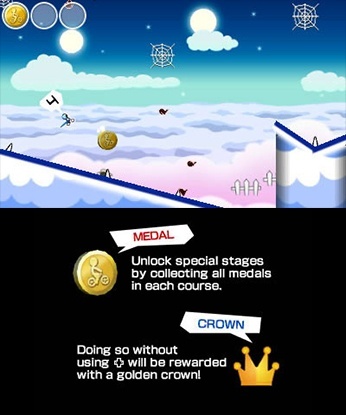Bike Rider DX2: Galaxy (Nintendo 3DS) Review
By John Son  25.09.2015
25.09.2015

Developed by Japanese business corporation Spicysoft, Bike Rider DX2: Galaxy is the latest in the line of side-scrolling action games originally developed for mobile platforms. With combined downloads of over 2.5 million, how does the latest in this hugely successful series hold up on 3DS?
The premise is simple: complete stages by pressing A to jump, twice to double jump, while avoiding obstacles and collecting the three gold medals dotted around in each stage. It's a simple system that works well, with the option to shift the character's position in the screen using the Circle Pad, although using this feature is discouraged. Collecting all three medals in a stage without using the Circle Pad rewards with a shiny golden crown on the stage selection screen - although, much like the medal collection system, this feature will only really appeal to completionists.
The main stages themselves are a whistle-stop tour of each of the twelve star signs, each sign presenting five courses, making for a total of 60 short courses to blast through in total. Stages are set on a different "planet," each with their own unique design, obstacles and idiosyncrasies. The fifth stage, "Aries," for instance, is set in a sheep-filled utopia-like environment in the sky, where windy updrafts can be ridden on to float through levels, while the backdrop for "Libra" features a monochrome, M.C. Escher-inspired aesthetic, and large scales that require precise timings to hop onto higher platforms. The graphics are kept deliberately simple and cartoonish, and range from mildly interesting to bizarrely outlandish in the case of "Pisces," which goes all out with the Japanese stereotypes and incorporates squids, Hokusai-esque ocean waves, and stick figures brandishing pieces of sushi. It's goofy in a charming sort of way, but gives the game some character, at least.

The level design itself is consistently solid all the way through, if not a little on the easy side. In fact, bar a few exceptions towards the end, players should face little problems in clearing all 60 initial courses - although, of course, it may take a little longer to nab all the golden medals, but even then, a majority of the time it's a simple matter of knowing when to press A at the right moment. Despite the fairly wide array of obstacles designed to impede progress, learning how to get around these often only takes one or two tries, although, in some cases, sheer dumb luck often succeeds in favour of carefully planned precision jumping. This is especially the case in "Pisces," where frantically flailing platforms make timings difficult to judge, and fish randomly jump up from below without warning - both of these instances can sometimes make the gameplay a little needlessly frustrating. In addition, the fact that it only takes one hit from an obstacle to end the level can feel off-putting at times, particularly in the later levels.
In a similar vein, the power-ups provided sometimes err on the side of frustration; the Frog Rider power-up, in particular, which requires the A button to be held down to power up for bigger jumps, feels gimmicky and sluggish, and is best avoided. Conversely, the Wing Rider power-up grants the ability to flap into the air Balloon Fight-style, and is easy (not to mention quite fun) to control - while it lasts. For the most part, however, power-ups are optional and astute players can manage to complete courses without having to utilise them, if they so wish.
After the initial 60 levels are cleared (and on the proviso that enough gold medals have been collected), a further 15 "Extra" levels are unlocked, and it's here where the difficulty finally ramps up to a satisfying degree. Much like the rest of the game, the courses range from fairly breezy to dizzyingly obtuse - that is, if the player hasn't already tired of the relative simplicity and ever-so-slightly repetitive nature.

Cubed3 Rating
Good
With some decent level design and a good few challenging tasks at hand, Bike Rider DX2: Galaxy is still a moderately fun way to kill a few spare minutes. Although its smartphone roots are evident from the lack of any real depth to the gameplay, its "pick up and play" nature feels well suited to those simply in need of some uncomplicated platform-based gaming on the 3DS.
Comments
Comments are currently disabled

 Sign In
Sign In Game Details
Game Details
 Out now
Out now  Out now
Out now  Out now
Out now  Out now
Out now  Subscribe to this topic
Subscribe to this topic Features
Features






 Top
Top

